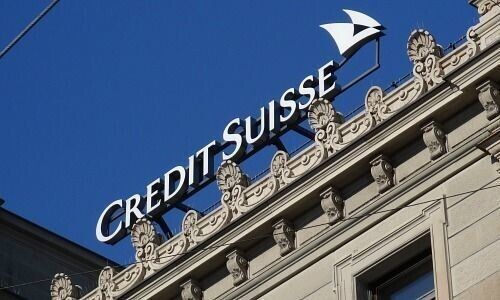Press «play» to listen to this content
1x
Playback Speed- 0.5
- 0.6
- 0.7
- 0.8
- 0.9
- 1
- 1.1
- 1.2
- 1.3
- 1.5
- 2
credit suisse taps loyalists, super-wealthy for quick infusion. the swiss bank's existing major shareholders, super-wealthy individuals, and other institutions are ponying up $1.85 billion following archegos' blow-up. zurich-based credit suisse is issuing mandatory convertible notes for a net infusion of roughly 1.7 billion swiss francs ($1.85 billion), it said in a statement on thursday. the move bolsters its capital after it took 4.4 billion franc hit on archegos, a family office-cum-hedge fund which blew up at the end of last month. the swiss bank already emitted a first allotment of notes, which will convert into a total of 203 million shares. the instruments were sold to undisclosed existing shareholders, institutional investors, and ultra-high-net-worth individuals. the second batch, due next week, is to be opened to shareholders on a one right-one share of credit suisse conversion. backstopped by loyalists. this is expected to as many as 60 basis points to credit suisse's hardest form of capital, which stood at 12.2 percent in the first quarter. while the regulatory minimum is 10 percent, credit suisse desperately wants to keep this metric – common equity tier 1 – at more than 12 percent. the first group of note-holders has agreed to take up any shares not bought by credit suisse's other investors. it isn't immediately clear which of credit suisse's core investors bought shares: saudi arabia's olayans are staunch loyalists, as is qatar and its ruling family, the al-thanis. long-time supporters. priced at a five percent discount to the average price price on thursday and friday, the notes will convert into shares in six months. credit suisse will pay holders a 3 percent annual coupon until then. with 5.2 percent of credit suisse's shares, qatar's sovereign wealth fund is its largest shareholder. it is followed closely by decades-long backers the olayan group (4.93 percent) and by harris associates, a natixis vehicle where u.s. fund manager dave herro is a long-time ally of the bank (5.17 percent). complicated qatar ties. a credit suisse spokeswoman wasn't immediately available to comment on which «core» shareholders injected cash. the emirate came to credit suisse's rescue during the 2008/09 crisis. the bank paid qatar 380 million francs in coupons every year on that injection, until it redeemed the instruments three years ago. the cash call for archegos was likely complicated by sheikh hamad bin jassim al thani, prominent member of the ruling family, reportedly losing money in the bank's greensill funds. more to follow.
Credit Suisse Taps Loyalists, Super-Wealthy for Quick Infusion
The Swiss bank's existing major shareholders, super-wealthy individuals, and other institutions are ponying up $1.85 billion following Archegos' blow-up.
Zurich-based Credit Suisse is issuing mandatory convertible notes for a net infusion of roughly 1.7 billion Swiss francs ($1.85 billion), it said in a statement on Thursday. The move bolsters its capital after it took 4.4 billion franc hit on Archegos, a family office-cum-hedge fund which blew up at the end of last month.
The Swiss bank already emitted a first allotment of notes, which will convert into a total of 203 million shares. The instruments were sold to undisclosed existing shareholders, institutional investors, and ultra-high-net-worth individuals. The second batch, due next week, is to be opened to shareholders on a one right-one share of Credit Suisse conversion.
Backstopped By Loyalists
This is expected to as many as 60 basis points to Credit Suisse's hardest form of capital, which stood at 12.2 percent in the first quarter. While the regulatory minimum is 10 percent, Credit Suisse desperately wants to keep this metric – common equity Tier 1 – at more than 12 percent.
The first group of note-holders has agreed to take up any shares not bought by Credit Suisse's other investors. It isn't immediately clear which of Credit Suisse's core investors bought shares: Saudi Arabia's Olayans are staunch loyalists, as is Qatar and its ruling family, the al-Thanis.
Long-Time Supporters
Priced at a five percent discount to the average price price on Thursday and Friday, the notes will convert into shares in six months. Credit Suisse will pay holders a 3 percent annual coupon until then.
With 5.2 percent of Credit Suisse's shares, Qatar's sovereign wealth fund is its largest shareholder. It is followed closely by decades-long backers the Olayan Group (4.93 percent) and by Harris Associates, a Natixis vehicle where U.S. fund manager Dave Herro is a long-time ally of the bank (5.17 percent).
Complicated Qatar Ties
A Credit Suisse spokeswoman wasn't immediately available to comment on which «core» shareholders injected cash. The emirate came to Credit Suisse's rescue during the 2008/09 crisis. The bank paid Qatar 380 million francs in coupons every year on that injection, until it redeemed the instruments three years ago.
The cash call for Archegos was likely complicated by Sheikh Hamad bin Jassim Al Thani, prominent member of the ruling family, reportedly losing money in the bank's Greensill funds.
More to follow






































